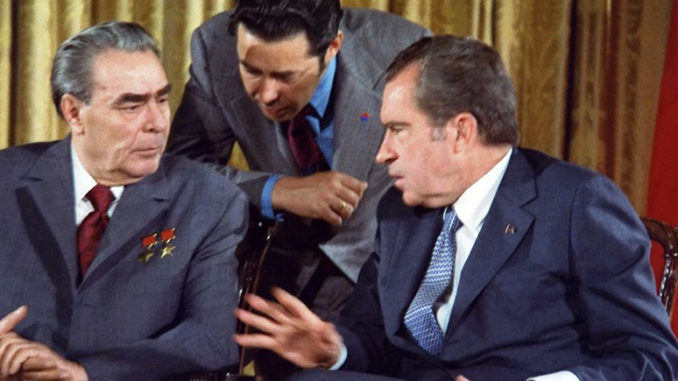
| Guest Editorial By Don Sutherland
The deterioration in the bilateral U.S.-Russia relationship has led to President Trump’s seeking to rewind the clock back nearly five decades to the early 1970’s. On April 24, U.S. Ambassador to Russia, Jon Huntsman informed a roundtable in Vladivostok that President Trump has “a desire for détente” with Russia. Ambassador Huntsman’s comments came a day after the U.S. Department of Treasury extended the deadline for compliance with sanctions that were imposed on Russian aluminum producer United Company RUSAL PLC and its subsidiaries.At the time the Nixon Administration devised Détente in 1969, the Western policy of Containment against the Soviet Union and its allies had frayed. The Soviet Union was approaching military parity with the United States. The Soviet Union was also engaged across the globe in geopolitical opposition to American interests, allies, and policies, diplomatically, economically, and militarily in proxy wars. Détente was developed to serve as a “safety net,” former Secretary of State Henry Kissinger explained. Such a safety net was necessary to provide the U.S. with strategic space to carry out a sophisticated foreign policy intended to strengthen the free world while minimizing the risk of direct conflict with the Soviet Union. Such a broad foreign policy contrasts sharply with the dramatic narrowing of U.S. foreign policy that has defined the first 15 months of the Trump Administration. For any bilateral relationship to be sustainable, it needs to be founded on mutual interests. Such a basis evolved in the face of rising Soviet power. An October 20, 1969 memorandum from Kissinger to President Nixon highlighted “growing mutual recognition of the need to avoid war” as “the solid basis of Détente.” Détente would provide the mechanism for “accommodation” between the two superpowers “within a framework of selective competition.” Arms control would be the centerpiece of that managed cooperation, as arms control offered the most promising chance to avoid Soviet military superiority. Détente was viewed as a limited avenue for cooperation. It did not represent a radical change in relationship. It “was not a starry-eyed quest for cooperation for its own sake, but a method for conducting the geopolitical competition,” Kissinger later wrote. Détente drew from a foreign policy that emphasized the national interest and the balance of power, both of which would have been profoundly impacted were the Soviet Union to achieve military superiority. As that outcome had not yet occurred, the U.S. possessed possibilities for precluding it. Détente offered one such avenue. Strength was the key to success with Détente. Without American strength and the willingness to deploy it, the Soviet Union would have had little incentive to pursue limited cooperation that could impede any quest for military superiority. Instead, the Soviet Union recognized that the U.S. remained militarily formidable and that its vast economy gave it a capacity to meet the Soviet challenge. It also understood the constraints imposed by its own economic fragility. Hence, the Soviet Union found appeal in Détente. Under Détente, the Soviet Union eagerly engaged the United States, often seeking to go beyond arms control. Meanwhile, the U.S. skillfully linked a wide range of geopolitical issues to secure greater Soviet restraint than would have been possible without Détente. In doing so, it was able to strengthen Western Europe, make a historic opening to China, address the Arab World’s aggression against Israel, and make human rights progress, all the while achieving significant arms control breakthroughs. Détente later crumbled on account of the Ford Administration’s post-Watergate weakness, Congress’ foreign policy fatigue, and the Carter Administration’s increased emphasis on softer ideals, which culminated in its abandoning the Shah of Iran. The aftershocks of that fateful blunder still reverberate in the Middle East today. In that context, an opportunistic Soviet Union became more active in Africa and later Afghanistan. Could Détente be feasible today? Much will depend on whether there is, in fact, a mutual and meaningful basis for cooperation between the United States and Russia and whether Détente is a component of a broader U.S. foreign policy focused on the national interest and Russia’s conduct. Absent either element, there would be a high risk that Détente 2.0 could become little more than a naïve “starry-eyed quest” for good relations with a revanchist Russia. Such a venture would have no more prospect of long-term success than President Obama’s ill-fated “Reset” initiative had. Temporary accommodation might be achieved, but at a steep price of renewed economic engagement with Russia, Moscow’s annexation of Crimea becoming permanent, and Russia’s recently expanded role in the Middle East being normalized. |
